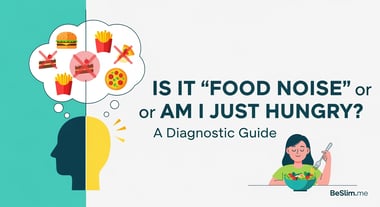Hello, I'm Master Kim, your Behavioral Psychologist and Solution Consultant at BeSlim.me. If you're here, you're likely grappling with that relentless mental chatter about food—those constant thoughts, cravings, and distractions that make healthy eating feel like an uphill battle. You're not alone in this struggle; it's a completely normal experience for so many on their wellness journey. Food noise, often described as intrusive thoughts about eating that disrupt focus and willpower, can feel overwhelming, but understanding and addressing it is key to lasting change. In this Q&A explainer, we'll dive into whether it's possible to eliminate it forever, exploring the science, reasons, and practical steps to quiet it down. Let's get started with your most pressing questions.
What Is 'Food Noise' and Why Does It Feel So Persistent?
Q: I've heard the term 'food noise,' but what exactly is it?
A: Food noise refers to the ongoing mental buzz around food—think obsessive thoughts about what to eat next, cravings that pop up uninvited, or that inner voice debating whether to indulge. It's not just hunger; it's a psychological distraction that can sabotage weight loss or healthy habits. Many people experience it during dieting, stress, or habit changes, making it hard to focus on anything else. The good news? It's not a permanent state—it's a symptom of deeper behavioral and biological patterns we can address.
Q: Can you really get rid of food noise forever, or is it something I have to live with?
A: Yes, it's possible to significantly reduce or even eliminate food noise long-term, but "forever" depends on sustained effort and lifestyle integration. It's not about a quick fix; it's about rewiring habits and mindsets. Research shows that with consistent behavioral strategies, people can quiet these thoughts, leading to more intuitive eating. However, occasional flare-ups might occur during high-stress periods, so think of it as managing a skill rather than eradicating a flaw. The key is building resilience through science-backed techniques.
The 'Why' Diagnosis: Understanding the Roots of Food Noise
Food noise doesn't appear out of nowhere—it's rooted in a mix of psychological, behavioral, and hormonal factors. Let's break it down in simple terms, drawing from behavioral science, to help you see why it's happening and how it's not your fault. This understanding is the first step toward control.
At its core, food noise stems from habit loops, a concept from behavioral psychology where cues trigger routines that lead to rewards. For instance, stress (the cue) might prompt emotional eating (the routine) for a quick dopamine hit (the reward), creating a cycle that's hard to break. Over time, this loop strengthens neural pathways in the brain, making food thoughts automatic and noisy.
Hormonally, chronic stress plays a big role. When you're stressed, your body releases cortisol, the "stress hormone," which can increase appetite and cravings for high-calorie foods. This is an evolutionary holdover: in ancient times, stress signaled danger, so the body craved energy-dense foods for survival. Today, it manifests as food noise during busy workdays or emotional lows. According to research, chronic stress elevates cortisol levels, leading to emotional eating patterns, which explains why food thoughts intensify under pressure.
Psychologically, willpower depletion adds fuel to the fire. Known as ego depletion in studies, our mental energy for self-control is finite—like a muscle that tires out. After a day of decisions, resisting temptations becomes harder, amplifying food noise. Combine this with environmental factors, like constant food ads or easy access to snacks, and it's no wonder thoughts spiral. Scientifically, brain imaging shows that food cues activate the reward center (nucleus accumbens), similar to addiction responses, making noise feel addictive. Studies on brain reward systems highlight how dopamine drives food cravings, turning simple hunger into persistent mental chatter.
In short, food noise is your brain's way of seeking comfort or reward in a modern world full of triggers. It's not a lack of discipline; it's a natural response we can recondition.
Actionable Solutions: Strategies to Quiet Food Noise
Now that we understand the "why," let's move to the "how." Based on behavioral science, here are four practical, step-by-step strategies to reduce food noise. Each focuses on sustainable changes, with examples to make them relatable. Implement one at a time for the best results, and track your progress in a journal.
Strategy 1: Disrupt Habit Loops with Mindful Awareness
Habit loops thrive in autopilot mode, so bringing awareness breaks the cycle. This draws from cognitive behavioral therapy (CBT) principles, which emphasize identifying triggers before they escalate.
- Identify your cues: For a week, note when food noise peaks—e.g., after a stressful meeting or while scrolling social media. Use a simple app or notebook.
- Pause and reflect: When a thought arises, take a 10-second breath and ask, "Is this true hunger or a habit?" This creates a mental gap.
- Replace the routine: Swap eating with a non-food reward, like a short walk or herbal tea. For example, if evening TV triggers snack thoughts, prepare veggies instead.
Scenario: Sarah, a busy mom, noticed food noise hit during her commute home. By pausing to journal her emotions, she realized it was stress, not hunger, and replaced it with podcasts—reducing noise by 70% in a month.
Strategy 2: Manage Stress to Lower Cortisol and Cravings
Since stress amplifies hormonal drivers of food noise, proactive stress reduction is key. This is supported by evidence linking mindfulness to lower cortisol and better eating behaviors.
- Build a daily stress buffer: Start with 5-10 minutes of deep breathing or meditation each morning to set a calm tone.
- Incorporate movement: Aim for 20 minutes of light exercise, like yoga, which reduces cortisol. Schedule it during high-noise times.
- Create boundaries: Limit exposure to stressors, such as setting "no work emails after 7 PM" to prevent evening cravings.
Scenario: John, dealing with work stress, used evening walks to unwind. Over time, his cortisol-driven food thoughts faded, allowing him to enjoy meals mindfully without constant distraction. Mindfulness practices can effectively reduce stress-related eating, as shown in clinical reviews.
Strategy 3: Replenish Willpower Through Routine Optimization
To combat depletion, optimize your day to conserve mental energy, making it easier to resist noise.
- Prioritize decisions: Handle big choices early when willpower is fresh—e.g., meal prep in the morning.
- Automate habits: Use tools like pre-portioned snacks or apps that remind you of healthy options, reducing decision fatigue.
- Recharge with micro-breaks: Every 90 minutes, take a 5-minute break for stretching or gratitude journaling to rebuild reserves.
Scenario: Emily, exhausted from daily temptations, automated her lunches with set recipes. This freed mental space, quieting noise and helping her stick to goals without burnout.
Strategy 4: Reframe Thoughts with Positive Reinforcement
Shift from fighting noise to redirecting it, using positive psychology to build new neural pathways.
- Challenge negative narratives: When a craving hits, reframe it positively—e.g., "This thought is just a signal; I choose nourishment over noise."
- Reward progress: Celebrate small wins, like a noise-free afternoon, with non-food treats like a favorite hobby.
- Visualize success: Spend 2 minutes daily imagining a quiet mind during meals, reinforcing the change.
Scenario: Mike reframed his post-dinner cravings as "opportunities for self-care" and rewarded himself with reading. Within weeks, the noise diminished, fostering sustainable habits.
These strategies, when practiced consistently, can lead to profound shifts—many clients report food noise becoming a whisper after 4-6 weeks.
Is There Hope for Long-Term Freedom from Food Noise?
Q: What if these strategies don't work right away?
A: Patience is part of the process. Food noise often lessens gradually as new habits form—neuroscience shows it takes about 66 days on average for behaviors to stick. If it persists, consider consulting a professional for personalized tweaks. Remember, setbacks are data, not failures.
Q: How do I know if I'm making progress?
A: Track metrics like how often noise interrupts your day or your ability to focus on non-food activities. Progress might look like enjoying a meal without second-guessing or handling stress without turning to food.
Encouragement Closing
You've taken a powerful step by seeking answers—change is absolutely possible, and quieter days are ahead. Remember, silencing food noise forever isn't about perfection; it's about progress and self-compassion. With these tools, you're equipping yourself for a more peaceful relationship with food. Keep going; you've got this.
References
- Chronic stress elevates cortisol levels, leading to emotional eating patterns - ncbi.nlm.nih.gov
- Studies on brain reward systems highlight how dopamine drives food cravings - pubmed.ncbi.nlm.nih.gov
- Mindfulness practices can effectively reduce stress-related eating - mayoclinic.org
Medical Disclaimer
The content on this website is for informational and educational purposes only. It is not intended as medical advice and should not be relied upon as a substitute for consultations with qualified healthcare professionals who are familiar with your individual medical needs. Always seek the advice of your physician or other qualified healthcare provider with any questions you may have regarding a medical condition. Never disregard professional medical advice or delay in seeking it because of something you have read on this website.




